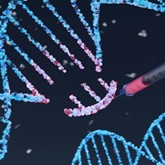
Mitochondrial neurogastrointestinal encephalomyopathy (MNGIE) is an uncommon disease resulting from TYMP mutations and a lack of thymidine phosphorylase which leads to an autosomal recessive disorder. An accumulation of thymidine and deoxyuridine hampers the maintenance and structural integrity of the mitochondrial DNA. At Protheragen, we focus on providing complete research solutions for rare gastrointestinal illnesses, MNGIE included. We assist professionals through a one-stop service approach to enhance the understanding and therapy of these complex conditions.
Mitochondrial neurogastrointestinal encephalomyopathy (MNGIE) syndrome is a disorder with multisystem manifestation. This condition is scarce and has a projected prevalence of 1 in 1,000,000 in Europe and an average mortality age of thirty-seven years. The syndrome is characterized by symptoms of myopathy and neurodegeneration caused by dysfunctions in mitochondrial DNA replication. The disorder typically manifests during the second decade of life and consists of autonomic gastrointestinal dysmotility and peripheral neuropathy.
 Fig.1 Molecular defect in MNGIE. (Bax B. E., 2020)
Fig.1 Molecular defect in MNGIE. (Bax B. E., 2020)MNGIE is an autosomal recessive disorder resulting from mutations in the thymidine phosphorylase gene. Thymidine phosphorylase, encoded by TYMP, catabolizes the breakdown of thymidine (dThd) and deoxyuridine (dUrd) to their corresponding bases. Loss of function mutations in TYMP severely reduce or eliminate thymidine phosphorylase activity, causing dThd and dUrd to accumulate, along with mitochondrial DNA abnormalities.
 Fig.2 Major features of MNGIE. (Pacitti, D., et al., 2018)
Fig.2 Major features of MNGIE. (Pacitti, D., et al., 2018)| Drug Names | Mechanism of Action | Targets | NCT Number | Research Phase |
| EE-TP | Erythrocyte-encapsulated thymidine phosphorylase is used to replace the missing enzyme. | Thymidine | NCT03866954 | Phase II |
| AHSCT | The transplant of stem cells is known as AHSCT, and it aims to induce the production of thymidine phosphorylase. | Thymidine | NCT02427178 | Phase I |
| Hematopoietic Gene Therapy | It corrects the abnormal nucleoside concentration in plasma and tissues like the small intestine which are affected by MNGIE. | TYMP | / | Preclinical |
Disclaimer: Protheragen focuses on providing preclinical research services. This table is for information exchange purposes only. This table is not a therapy plan recommendation. For guidance on therapy options, please visit a regular hospital.
Implementing cutting-edge technologies and approaches to the utmost level of research quality and precision. Our diversified platforms include services for diagnostics, therapeutics, and disease modeling, which ensure that the research support received is of the highest quality. Moreover, we also offer services in pharmacokinetics research and drug safety assessment for the development of novel therapeutic strategies for rare gastrointestinal diseases.

For the comprehension of disease processes and evaluation of prospective therapy methods, animal models' development is imperative, and they also enhance the speed of drug development. Our company offers tailored services in the creation of accurate animal models for MNGIE and other rare disorders of the gastrointestinal tract.
Targeting disrupts or deletes the TYMP gene or other relevant genes to produce animal models that closely mimic the genetic defects seen in MNGIE.
Optional models:
Protheragen can help you advance your research in rare gastrointestinal diseases. We know that every project comes with its own set of challenges. Because of that, our services are customizable to fit the precise requirements of your research. Get in touch with us today and let us help you achieve your research objectives.
References
All of our services and products are intended for preclinical research use only and cannot be used to diagnose, treat or manage patients.